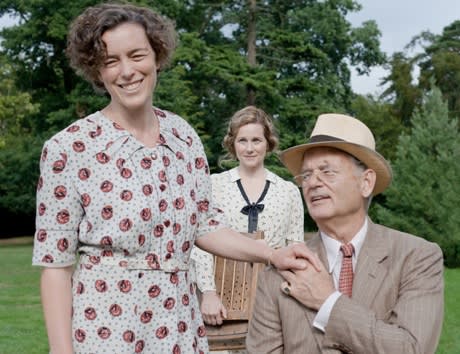As is the trend with period pieces of late, Roger Michell's tenuous and sanitized Hyde Park on Hudson focuses on a pivotal, yet mostly uneventful moment in time. He takes the road of the similarly pedestrian costume drama that Tom Hooper's undeservedly championed but handsomely framed biopic, The King's Speech, did in demystifying recent historical figures and world leaders, making relatable the previously mystified. Here, the dirty laundry being aired comes from the Roosevelt administration, with FDR (Bill Murray) accepting the occasional hand-job from fifth cousin Daisy (Laura Linney), who has come to help him "relax" at his family estate in upstate New York, incidentally near the Hudson River. The story takes place over the span of a significant weekend, one where King George VI (Samuel West) and Queen Elizabeth (Olivia Colman) step foot on U.S. soil to mend differences and seek political backing. Taking place just prior to WWII, this special relationship — one mirrored awkwardly by the proposed necessity of infidelity — ultimately holds an important place in history. But, as is the case with vital historical moments forged through words rather than guns, there's little drama about this event, leaving Daisy's frothy correspondence, unearthed from a shoebox under her bed following her death in 1991, to guide the story through wild tonal shifts. Be it via saucy comedy, standard-issue moral justification or impeccably lit melodrama, the weekend hosts too many pointed, convenient conversations and revelations to cohere as a likely testament to this moment in time. Hints at Eleanor Roosevelt's (Olivia Williams) lesbianism come up as incidentally as Daisy's realization that she's not the only "friend" Franklin has going on the side. They're there mainly to titillate, propel and force some strained subtext about the importance of special relationships and the occasional need to denigrate oneself for the greater good. This message is made abundantly clear by the metaphor of the hotdog. As old Lizzy and her stuttering hubby act horrified by the overall classlessness of Americans, frowning at quaint beds and the lack of majestic surroundings, they debate the eating of a hotdog; it's a new food that FDR feasts on at BBQs, showing his relation to the people. Whether the mystery meat is a symbol of fellatio — a photo of the King taking a bite seems quite provocative in this context — and resulting subservience or merely a mode of degradation, tarnishing the image that the monarchy had built for themselves, Elizabeth was adamant that George not stuff between his eager, stuttering lips. Similarly, Daisy's eventual acquiescence to being the equivalent of the potential fourth wife on Big Love is shaped as the sort of reluctant concession we make in life when ideals prove a moot point. It's an interesting assertion but one that is riddled with too diffident an approach. Michell is more comfortable with framing things nicely and teasing ideas he's far too fearful to outright state, which is why his fluctuating, overly contrived yarn isn't quite the success it aspired to be.
(eOne)Hyde Park on Hudson
Roger Michell

BY Robert BellPublished Apr 19, 2013